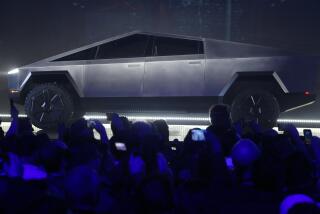Irvine Sensors Announces $5.2-Million SDI Contract : Defense: The Costa Mesa-based firm is expected to step up hiring for the military project.
- Share via
COSTA MESA — Irvine Sensors Corp. said Tuesday that it has won a $5.2-million government contract, the largest single order in the company’s history, to develop sensors that works like the human eye and brain.
The contract will likely result in hiring at the Costa Mesa-based company, which now has a work force of about 45 in Orange County, spokeswoman Lynn O’Mara.
The “neural network sensor” will be developed as the first phase of a project to make modules that mimic the recognition abilities of the brain. “We don’t know of any other technology that offers that kind of potential in the foreseeable future,” said John Carson, the company’s chief technical officer.
The 26-month contract will be supervised by the the Navy’s Office of Naval Research as part of the Strategic Defense Initiative, an effort to create a ballistic missile defense capability.
A computer that has the recognition capabilities of the brain will have the ability to recognize threats and filter out nonessential information. “This is going to make smart munitions a lot smarter,” O’Mara said.
The technology centers on binding an infrared sensor to between four and 10 computer chips, making a package the size of a single ordinary chip. An earlier version of the chip was developed for the Navy to use in homing devices for air-to-air missiles.
The binding of chips is called “stacking,” and the technology led Irvine Sensors to an agreement in December with IBM to allow the computer giant to license the technology for its own use. “They are seeing this as something for the future,” O’Mara said of IBM.
In Tuesday’s NASDAQ trading, Irvine Sensors’ stocks gained 12.5 cents a share to close at $8.375.
More to Read
Inside the business of entertainment
The Wide Shot brings you news, analysis and insights on everything from streaming wars to production — and what it all means for the future.
You may occasionally receive promotional content from the Los Angeles Times.










